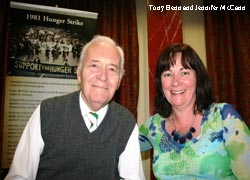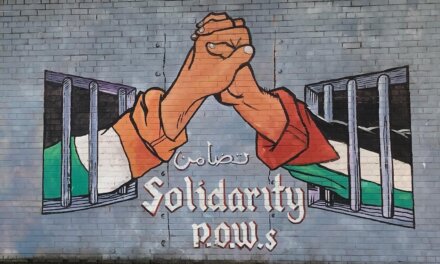A conference was recently held in London to mark the 30th anniversary of the hunger strike. Describing the day’s highly successful events, Jayne Fisher reports.
A fitting and poignant event to mark what was `one of the most heroic chapters in human history’ took place last Saturday, 18 June, in London. Opening the event with these words from Fidel Castro at the time of the 1981 Hunger Strike, more than 300 people packed into the London Irish Centre to listen to speakers, in what was a moving day of both testimony and political analysis of what was a key turning point.
The event was organised to mark the 30th Anniversary and to put the Hunger Strike in its wider political context. Organisers introduced the day, commenting that the Hunger Strike was not only a turning point in Irish history, and in the struggle for Irish freedom, it was one of the most important and courageous struggles to have taken place anywhere in history, anywhere in the world.
The conference, with a wide range of speakers from Ireland and internationally, looked at how the events unfolded, how they shone an international spotlight on the conflict in Ireland and shaped the political developments for decades to come.
The opening speaker, Brendan `Bik’ McFarlane, as the Officer Commanding of the IRA prisoners in Long Kesh during the Hunger Strike, gave a moving and a unique and detailed insight into what happened within the jail. Setting the tone for the day, Bik outlined the stakes involved, and how there was a clear political understanding of what was necessary. It was clear that the British government’s `criminalisation’ policy was central to their whole strategy overall; by criminalising the prisoners the whole struggle became criminalised and so the stakes for both the British government and Irish republicans were immense. Ultimately the British government were defeated, but this took the lives of ten men in the course of the struggle. He also spoke of the importance of the families, the quiet dignity and strength, in the face of immense pressure. During his detailed and extraordinary account of what took place, the audience sat in rapt silence, many near to tears and struck by the magnitude and heroism of those involved, and with a feeling that this was indeed a unique and privileged occasion to hear so directly about such a key moment in history.
Sinn Fein MEP Bairbre de Brun spoke about the development of the solidarity movement outside the prison, from her own involvement in the anti-H Block/Armagh Committee. With clear points to be drawn on for today, she outlined how a huge coalition developed, based on the simple demand of supporting those who wanted the inhuman condition of the prisoners to end, around their struggle. Developing a broad basis for the campaign, she related how this mass movement was possible to develop in a way not seen before. She pointed to the huge upturn in protest activity on the streets, and how it was met with violence from the British state, such as the use of 16,500 plastic bullets in just one month.
Former Labour MP Kevin McNamara analysed how the Hunger Strike impacted in within the British State, and how there were some voices, like his own, who refused to go along with the British imperialist agenda, against those like Don Concannon and Merlyn Rees, in the discussions at the time. His comments also revealed how leading politicians – including in the south of Ireland – were clearly affected by the mass mobilisations.
Writer and journalist, and current lecturer at City University, Roy Greenslade, spoke about the lies told in large sections of the British media about the Hunger Strike at the time, which was all a part of the propaganda war to attempt to defeat what was happening. He also pointed that such misinformation still prevails today, with a concerted and right wing campaign prevalent in many comment debates online. He urged people to challenge this aspect, and writing on the eve of the conference in the Guardian [link] Roy’s detailed proved an invaluable element of the day.
US-based academic and writer Professor Christine Kinealy gave a factual analysis of the events leading up to and after 1981, and also pointed out how the subsequent rise of Sinn Fein and the peace process underlined how the magnitude of the Hunger Strikes was greater than anyone could have envisaged at the time.
How 1981 shook the world, and the international impact of the Hungers strike in breaking the isolation of the prisoners, formed the theme of the second panel discussion.
Legendary leader of the struggle to defeat apartheid, Ronnie Kasrils gave an inspiring and incisive account of how the South African movement learned from the Irish struggle and vice versa. Quoting James Connolly on `Cause of Ireland is the cause of Labour and the cause of Labour is the cause of Ireland’ he argued that the national and social struggles were indivisible. He spoke of the worldwide struggle against imperialism and how alliances and common links were absolutely vital.
Former French MEP Francis Wurtz, who chartered a plane to travel to Belfast to attend Bobby Sands’ funeral, related the impact across Europe, which along with the wider international impact, helped overcome the idea that the prisoners were isolated. In fact it was the Thatcher government which became isolated and hated for its actions.
Writer and activist on Palestine and the Middle East, Kevin Ovenden, related how the whole of the Arab world was inspired by the hunger strike and the influence that it had. He said that leading figures today spoke about how inspirational the Hunger Strikes were. He spoke of how the unity of prisoners could be a unifying factor in the wider struggle and how the issue of human rights for prisoners could bring a wider interest and support.
From the chair Jeremy Corbyn MP spoke of the lasting legacy of the Hunger Strike and how relevant many issues remained, with strong resonances to some of today’s international struggles, in Palestine and elsewhere in the world.
In the final panel of speakers, Sinn Fein’s chief whip in the Assembly, and former political prisoner and friend of Bobby Sands, Jennifer McCann spoke of the role of women in what was a dual struggle, and how strongly interconnected the men and women involved were at the time. She also remarked that, like herself, Bobby was elected by the people, as the MP for Fermanagh & south Tyrone, and yet the British government still allowed him to die. Bobby’s election to Westminster, she said, and that of two of his comrades to the Irish parliament, marked a sea change in how Irish republicans looked at elections, and their potential, and could be seen as a catalyst for Sinn Fein’s electoral intervention the following year, 1982, and since. She also brought the discussions up to the present day, outlining the development of Sinn Fein’s political strategy and pointing to the growing strength and dynamic towards Irish unity – economic, social and political.
The final speaker was Tony Benn, who spoke of how it was necessary to see the Irish struggle for self determination not simply as a small isolated fight, but as part of a huge and general struggle against colonialism worldwide. He said this was not the case of a small band fighting a bigger monster, but a world-wide anti-colonial struggle. He pointed to the rise of Sinn Fein, the advancement of the cause of Irish unity and of his own conviction that Irish reunification would happen, it was only a question of how soon.
In summary, Stephen Bell in the chair said that the day had underlined the need for the Irish community, and others within Britain to do all possible to continue to support Irish unity. He said the best way to honour the Hunger Strikers was to contribute to this same struggle today. The initiative to open up the debate on Irish unity, to put this on the agenda, would continue he said, and urged people to take part. Film of the speakers will soon be available via youtube for those who missed it.




